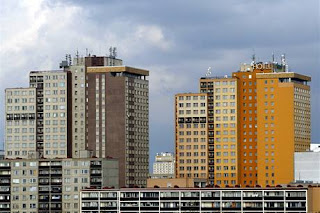Coming as I
do from the UK, I am, of course, used to politicians with a totally unblemished
record of moral rectitude. No way would any of our leaders do things like shagging
Cabinet colleagues while wearing a Chelsea shirt, allowing hookers to caress their
perfectly smooth happily married back, finding God while doing jail time for
perjury, or fiddling their expenses to build a duck house like this one…
Indeed not; we can leave that kind of thing to Johnny Foreigner. Who, at least in this neck of the woods, has been rubbing his hands in unconcealed glee for the last day or two, as what one MP has described as the most serious political scandal to have hit this country since 1989 has unfolded. Enter the star of our show, David Rath (pronounced ‘rat’), who, it’s fair to say, is one of the highest-profile and least liked figures to have pranced across the Czech political stage in living memory:
He brings the same kinds of qualities to Czech politics that, say, Berlusconi has done in Italy or Sarkozy in France, but with a heady mix of furious ambition and a kind of naked venality instead of Silvio’s loucheness or the Poison Dwarf’s pathetic pursuit of whatever limelight may be on offer. Although, unlike Nicolas, he is said to maintain not one happy home but two, in the same village, which, the joke now has it, is going to be the setting for a new Czech series of ‘Desperate Housewives’.
So just why
are these ladies so desperate? Well, it seems our Davidek has been caught with
his hands well and truly in the till and has been a guest of the police since
yesterday on corruption charges.
Exhibit A
is a shoebox. Its contents? Shoes? Not according to Rath, who said they were a
bottle of wine he had been gifted. The police, on the other hand, say there are
7 million crowns in the box. You can buy a lot of wine for that. You can also
float quite a few jokes:
This one revives an old TV quiz show called 'Kufr' (Suitcase): Rath is the one in the black tie.
This one is a spoof IKEA advert; the box, complete with cool Scandinavian name, is just perfect for that little 'bottle of wine' you have lying round the house.
Exhibit B is more money, this time under the floorboards, where there were 30 million crowns. Our boy tells us they were put there by the guy who laid the floorboards as part of a conspiracy to frame him. Well, of course. It happens all the time. This was probably about the time the dog ate his homework and a bottle full of Vaseline just happened to fall on to his dick.
This one is a spoof IKEA advert; the box, complete with cool Scandinavian name, is just perfect for that little 'bottle of wine' you have lying round the house.
Exhibit B is more money, this time under the floorboards, where there were 30 million crowns. Our boy tells us they were put there by the guy who laid the floorboards as part of a conspiracy to frame him. Well, of course. It happens all the time. This was probably about the time the dog ate his homework and a bottle full of Vaseline just happened to fall on to his dick.
Perhaps unsurprisingly, the police, themselves the butt of a myraid jokes about stupidity, have failed to take his words at face value, so our hero is now languishing on remand without so much as a bottle of wine or a cuddle from his womenfolk to console him. His erstwhile political bedpals, meanwhile, have dropped him like the hot potato that he has become – so much for being innocent till proven guilty, you might say, but, like most career politicians, he is not a person who arouses much sympathy. It can truly be said that this is a case of the shits abandoning the sinking Rath.














